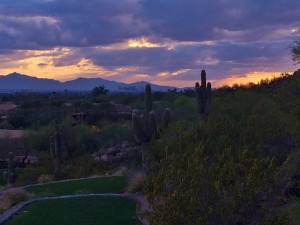Dear Readers, I had planned on blogging about a carpenter who uses his professional talents in his pastime of building sand sculptures. I met him and his wife last month and intend to share his story. However, I’ve decided to submit that article to a magazine and hope to get it published. For those of you, especially Marc and Debbie, who were expecting to read that article here, this month, please stay tuned for an update. If all goes well, I’ll have good news, and the article itself, to reveal at a later date. For now, please enjoy the following post in which I explain my perspective on golf.
“Do you golf?” seems to be a polite way for a golfer to ask someone else what he or she really wants to know: “Are you a good golfer?” The first question, although gentle, invokes just a hint of tension, as in “What do you do for a living?” The more specific second question verges into the realm of intrusiveness, like “How much money do you make?” A skillful, confident golfer would respond with a simple “Yes,” and no additional explanation would be needed. Instead, both good and bad golfers feel compelled to either elaborate on their level of expertise or mention how little they get out and practice.
Married to a golf addict, I refuse to be a golf widow. I play just enough so that I have a decent drive, can handle my irons, and don’t embarrass my husband too badly on the course. The one important thing I need to work on, however, is establishing my handicap—a golf score average developed from more than par, in my case. Somehow, I’ve avoided attaching the tell-tale label of a high handicap to myself for my entire golf life. Now I’m realizing the far-reaching extent of not embracing the numbers and exposing my personal limitation: I’m in golf limbo.
Without figuring out my own handicap, I can’t expect other golfers to know if I can keep pace or if I’ll slow the game down and burden my partners. To play with undesignated handicappers like me calls upon gracious golfers to offer, “We’re just out to have fun.” They’re good sports. Impatient golfers quickly seek to round out their foursomes with other known decent golfers so they can avoid the discomfort of playing with someone who makes it on the green in two and then takes a four putt.
I appreciate the gracious and can’t blame the impatient. Athletes of all kinds push themselves harder when they know their competitors have talent. Good golfers are motivated that way, and sometimes it’s just more fun to be evenly paired. You’re more likely to be relaxed and finish each hole in a timely manner.
Because I don’t play regularly, my golf prowess is subject to speculation. There’s a tendency for people who don’t know me to pass judgement on my abilities. Recently, after a round of golf during a business event, a woman who hadn’t been able to golf that day herself asked me if I had gotten stuck behind the slow group. I was pretty sure she thought I was the cause of the delay, since I was the only female in the two foursomes, and it’s often presumed to be difficult for women to keep pace with men. Feeling a bit defensive, I carefully selected my response and admitted to her, “I think we were the slow group.”
I wasn’t significantly hampering my group’s time, however. One of the men hadn’t played in several years. It took him a little while to get used to the set of clubs he had borrowed from the course and to find his swing again after being away from the sport for so long. As he worked out the kinks in his play, I relaxed more and more and shot one of my best games to date.
Even so, I realize that I have to focus on lowering my average score. Not just because of the image I want to present, but so I can enjoy specific privileges. I discovered that without an established handicap of 36 or less, I can’t play at world-renowned St Andrews Links, known synonymously as “the home of golf.”
Located in Scotland, St Andrews offers seven courses and is revered by golf’s masters. The Links’ online history page proudly boasts, “When Nicklaus waved goodbye to his adoring fans from the Swilcan Bridge in his final round of professional golf at the 2005 Open it demonstrated the warmth and affection held for the place where the game started.” Jack Nicklaus himself professed: “If a golfer is going to be remembered, he must win the title at St Andrews.” As one of the world’s most accomplished players, he achieved three Open wins, and two were at St Andrews on The Old Course.
St Andrews is open to the public and fuels the aspirations of amateurs, including my husband. His passion has infected me and I’ve learned to love and respect the gentleman’s game. After years of warming up to it, I’ve gathered fond memories: a particularly awesome chip shot and a well-played round; gorgeous scenery connected by expertly-groomed greens and fairways; intrinsic challenges and friendly conversations. My husband’s pilgrimage to golf mecca is important to me as well and is a part of our future plans. Someday it will be my turn to step upon the sacred ground at The Old Course, push my tee into the soft earth, and square up to take a swing. By nightfall, I’ll tally my score and tuck away favorite moments from across the pond. ‘Till then, I’m perfecting my answer to that loaded question, “Do you golf?” by simply and confidently replying, “Yes!”


I’m not a golfer, but I hope your game moves in the right direction so you can travel there. I had no idea golf courses had requirements. Exclusivity for membership at clubs, sure, but a public place restrictions… wow.
My answer to the question, “Do you golf” is always, “No, I never touch the stuff.” 🙂
Kelly,
Wishing you the best with the magazine article. You have a good take on those questions. “Do you golf?” This inquery can have multiple socio-economic answers. Beautiful photo.
Thank you, Karen. The scenery is one of my favorite things about golf. Perhaps you’re a golfer too?
Following comments.